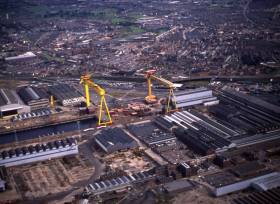Displaying items by tag: not apartments
Site of Harland & Wolff Must Not Become Apartments, Says UUP's Lord Empey
#BelfastLough - Harland and Wolff shipyards in Belfast, must be maintained for industrial use and not sold off to property developers, Lord Empey has said.
As The Belfast Telegraph writes, the former UUP leader was speaking after it emerged last week that the historic Belfast company was up for sale as its Norwegian parent company Fred Olsen carries out a major restructuring.
The former shipbuilder behind the Titanic has diversified into renewable energy installations since the last ship sailed out of its famous yard in 2003.
The decline of shipbuilding has also been marked by a steady fall in employee numbers from as many as 30,000 in the 1930s to around 100 today.
Harland and Wolff covers two sites on Queen's Island in east Belfast, including the Belfast Repair Dock where some ship work is still carried out.
There is also the main building dock and manufacturing halls where the famous Samson and Goliath gantry cranes operate.
The combined surface area of the sites is nearly 90 acres.
Former Northern Ireland Enterprise Minister Lord Empey has said that he fears the site may now fall into the hands of property developers.
For further comments by the former politician, click here.
























































